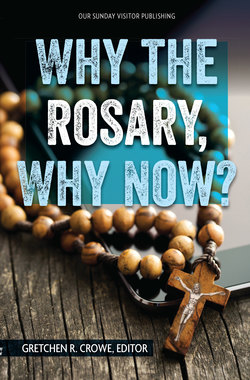Читать книгу Why the Rosary, Why Now? - Gretchen Crowe Editor - Страница 10
На сайте Литреса книга снята с продажи.
ОглавлениеChapter three
To Strengthen Families
One of the first inklings I had that I was going to marry my husband was the first time we prayed the Rosary together. The familiar prayers, recited one after the other, so well-known by each of us, connected us in a way that I’d never experienced before. It was both peaceful and exhilarating—the beginning of a strong foundation based on a mutual love of Jesus Christ and his Blessed Mother.
That experience is one reason why the famous words of “Rosary priest” Father Patrick Peyton resonate so deeply with me: “The family that prays together stays together.” This refrain was coined from Patrick Peyton’s lived experience, starting at a young age. In his autobiography, All for Her, Father Peyton (1909-92) explains how the family Rosary was a priority in his home every evening. No matter how exhausted his parents or eight brothers and sisters were at the end of the day, patriarch John Peyton insisted that the family gather to thank the Blessed Mother for watching over them for another day.
As a striking contrast, Father Peyton describes what life was like on his first night away from home after securing a job nearby. Having been welcomed into temporary residency in a Catholic home, he initially felt comfortable with the familiar family setting. He was shocked, therefore, when his host ushered him off to bed without first calling the family together to pray the Rosary as his father would have. “I was thunderstruck, absolutely speechless at the realization that a Catholic home existed … in which the people did not kneel together for family prayer,” he wrote. “While I pretended to sleep, I prayed my own Rosary and felt the pangs of homesickness, the bitterness of being among people whose ways were different from my own, whose sense of values failed to measure up to what all my training and experience had told me was normal.”
After a week, he finally admitted to his host how much it bothered him. “I don’t know what I said, but it was my first sermon on family prayer, my first appeal to another Catholic to imitate the practice of my own family and reap the same rewards,” he wrote.
Though he did not know it at the time, his appeal, however disjointed, was a success. The family soon after began praying the Rosary together every night.
This experience was clearly a pivotal moment for Peyton—one in which he realized that he could not and must not take the faith passed down to him by his parents for granted. And so it was this faith, personified in the Blessed Mother, to which he turned later in life when, during the course of his seminary studies, he fell gravely ill. The story of his return to health—his account of which follows—is the story of a miracle granted and a vocation confirmed. And it’s an event that propelled Father Peyton, once ordained, to devote the rest of his life to spreading family prayer, particularly in the Rosary.
The following excerpts from the first four chapters of All for Her chronicle this portion of his life, beginning with his earliest days in Ireland and ending with his miraculous healing. Afterward, Father Peyton began the Family Rosary Crusade, making use of radio, film, outdoor signage, and more than two hundred sixty Rosary rallies on six continents to promote family prayer to millions of people.
Such an effort sounds particularly appealing in modern times when it seems that Catholic families are moving further away from the Church and from actively nurturing a spiritual life in general. A 2015 study by the Center for Applied Research in the Apostolate at Georgetown University, in conjunction with Holy Cross Family Ministries, which carries on the legacy of Father Peyton, indicated the following troubling statistics about the current state of family participation in a life of faith: Only 22 percent of Catholic families attend Mass weekly; 68 percent of Catholic parents have not enrolled their children in religious education; only 17 percent of parents who pray on their own also pray as a family; and only 13 percent of families pray together before meals.
